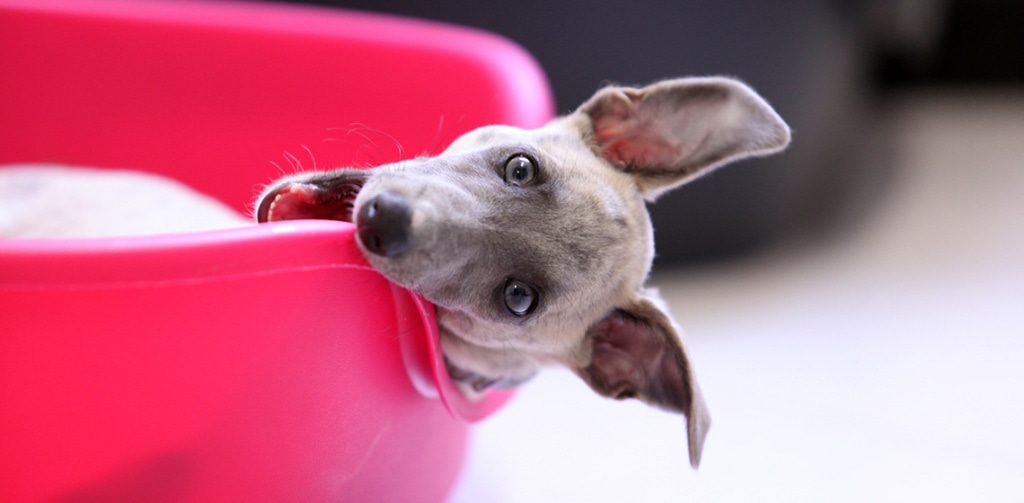Some dogs are not the most sensible when it comes to choosing what they put in their mouths. If your dog is particularly determined, it can seem almost impossible to stop them from eating things that they shouldn’t, no matter how hard you try. Sadly, it is common for foreign objects that are eaten to cause serious gut damage or even obstruction of the bowel.
Severity:
Mild if the object can pass, but severe if the object becomes stuck or is sharp
Table of Contents
Key points
- Small or soft objects may pass on their own
- Foreign objects can commonly lead to vomiting, diarrhea, or straining to pass feces
- You will need to see a veterinarian if your dog develops any symptoms
- Blood tests, scans, or x-rays may be needed
- If the object causes a gut blockage, surgery is required
Common in:
All ages and breeds. Any dog can eat something they shouldn’t, even if they haven’t in the past. However, ‘greedy’ dogs, young dogs, and those prone to scavenging are more at risk.
Symptoms and types:
When a dog eats plastic or any other foreign material, there are a few possible outcomes.
- Firstly, the foreign material could be small enough and smooth enough to pass with no damage, and in these cases, you may not see any symptoms at all until the foreign material appears in your dog’s feces and everyone breathes a sigh of relief.
- If the foreign material is a little bit rough or an awkward shape but is still small enough to pass, you may see some mild vomiting or diarrhea as it works its way through your dog’s guts.
If the material is sharp or pointy, like a skewer or bone fragment, it may penetrate through the wall of the gut, and lead to infection.
- If the foreign object cannot pass through the guts, the symptoms your dog will show will depend on the exact location where it has got stuck.
- If the blockage is in the stomach or the small intestine, you’ll often see severe vomiting, where your dog is unable to keep food or water down, and your dog may not be passing any feces.
- If the blockage is lower down the bowel, in the colon, you might notice your dog straining to pass feces a lot, but not passing anything. Sometimes, if the blockage has been there for a while, your dog might start to vomit.
- In severe cases, your dog is likely to be off their food, lethargic, and very quiet, as well as any vomiting or diarrhea and they might show signs of pain if you touch their belly.
Understanding the diagnostics
If your dog has eaten something they shouldn’t have and they develop symptoms, they must be checked over by a veterinarian. One of our team will be able to give them a thorough examination, including checking their hydration, checking their temperature, and feeling their tummy for any painful or abnormal areas.
If there is concern about the possibility of a gut obstruction, your veterinarian will recommend an x-ray or ultrasound scan to try to locate the blockage. They might also advise doing blood tests to check how poorly your dog is and what medical support they may need.
Learning about the causes
There are many different types of foreign objects that are consumed by dogs regularly and can cause gut obstruction. These include bones (cooked and raw), clothing, toys, plastic bags, stone fruits, kebab skewers, and tape or string.
Sometimes these pass with no issues, and sometimes just mild symptoms are caused. However, a gut blockage is relatively common when foreign material is eaten, and there are other risks too.
If the material is sharp or pointy, like a skewer or bone fragment, it may penetrate through the wall of the gut, leaking fecal material into your dog’s belly and leading to a serious and life-threatening infection called peritonitis.
If your dog eats cord, rope, string, tape, or anything else long and thin, this often gets stuck as it works its way through the gut and is called a ‘linear foreign body‘. As the gut uses peristalsis to try to squeeze the material through, the foreign material can cut through the wall of the gut like a cheese wire, again leading to leakage of fecal material and peritonitis.
If your dog eats plastic or another foreign material, it’s always best to inform your veterinarian that it has happened so that you can get their advice.
Best treatment options
If the foreign material is small enough to pass without causing a problem, then no treatment is required. However, if you know that your dog has eaten something they shouldn’t have and then they develop even mild vomiting or diarrhea, it is essential to get them checked by a veterinarian.
- If there is some mild irritation of the guts, but no blockage, your veterinarian might prescribe medication to help heal the inflamed intestine and stop any sickness. They might also recommend feeding a bland diet.
- Sadly, if it seems that the foreign material is not going to pass, or that the intestine wall has been perforated, your dog will need an operation to remove the blockage and clear the abdomen of infection. This can be a serious operation and often requires a few days in the hospital to recover.
Home remedies and their effectiveness
If your dog has eaten plastic or something else they shouldn’t have, feeding a bulky meal to try to pad out any sharp edges and help it to pass can be a good option. Asparagus is often used for this. However, it is always best to speak to one of our team first, since causing too much bulk may increase the risk of obstruction.
Feeding a bland diet if your dog has eaten foreign material is a good idea, but only if they are not showing symptoms. If symptoms develop then you must contact your veterinarian without delay rather than monitoring them at home.
When to see a vet
If you know that your dog has eaten something that could be toxic or might damage the gut, you should contact your veterinarian immediately. If the object is small and could pass it is still a good idea to inform one of our team, although our advice may be to feed a bland diet and monitor for any symptoms.
If your dog develops vomiting or diarrhea or seems unwell after eating foreign material, an urgent appointment with a veterinarian will be needed, to check whether there is an obstruction.
FAQ
If your dog eats plastic it may pass, or it may get stuck as it makes its way through the guts. Sadly, there is no way to know for sure whether it will pass until it does, so if your dog develops vomiting or diarrhea you must speak to a veterinarian.
If the plastic becomes lodged in the gut and causes a blockage, the gut could rupture. Equally, if the plastic is sharp it could poke through the gut wall, again causing rupture. When fecal material leaks from the guts into the abdomen, it causes an infection called peritonitis, which can be fatal.
The symptoms of a gut blockage depend on where the blockage is. If the blockage is in the stomach, then your dog may only show intermittent vomiting, whereas if the blockage is lower down you are likely to see continuous, severe vomiting, or persistent straining to pass feces.
Avoiding dog toys with any plastic and removing plastic items from your dog’s reach, where possible, will help to stop them from chewing. However, for persistent chewers or scavengers, you may need to consider the use of a qualified behaviorist, or even using a muzzle when they are unsupervised.

Dr. Hannah Godfrey MRCVS graduated from the Royal Veterinary College in 2011. Although she initially worked in mixed practice treating all species, she found a love for small animal work and has worked exclusively with dogs and cats since 2014. She lives in Wales with her partner, son, and two cats (named Poppy and Ashton Kutcher), and writes comedy fiction in her spare time.










